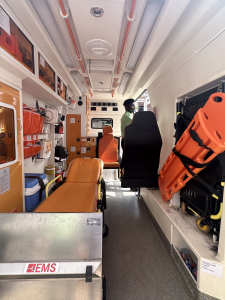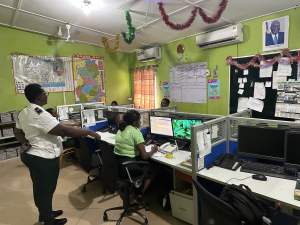I will be participating in a two-week elective rotation in Accra, Ghana working with the Ghana National Ambulance Service (NAS). During this time, I will be spending some time at the National Headquarters meeting with the leadership of the NAS, I will also spend some time working at the Dispatch center and some time at ambulance stations participating in some ride-alongs with the response teams. The overarching purpose of this time is to get first-hand experience with pre-hospital care in West Africa. Gleaning from my experience with working with Emergency medical services here in the US especially within the setting of the emergency department in hospitals, I will be exploring ideas with first responders who work for the NAS. We will deliberate on and brainstorm strategies and ideas for improving the quality of pre-hospital emergency care offered within the system, as well as think through how these fits with the emergency care offered within the hospital. This is very important because in West Africa especially, emergency and pre-hospital care systems are largely underdeveloped. This experience is a valuable step in conceptualizing possible roadmaps towards more robust, contextually relevant pre-hos pital care systems which can be adapted to various countries in West Africa
Three different populations will benefit from this project. First, the local population within Accra Ghana and the ones in the surrounding regions who are currently being served by the Ghana National Ambulance Service. This population is important because Ghana currently has one of the more developed emergency care systems in West Africa. Therefore, any opportunity to help build this system, serves to push the boundaries of possibility within the realm of emergency care in less developed regions in West Africa.
Secondly, this experience will benefit the emergency medicine community in Nigeria. I was born and raised in Nigeria and for the past 6 years, I’ve been involved in multiple research projects to understand the current state of emergency care in Nigeria. Pre-hospital care in Nigeria is largely non-existent. Thus, this project is a strategic step in gaining valuable insight in pre-hospital care in West Africa, that can be shared with and implemented by colleagues in the Nigerian emergency medicine community.
Finally, the third population is my group of current co-residents and future ones who may be interested in Emergency Medicine in low- and middle-income countries, particularly in Sub-Saharan Africa. As a recipient of the vast experiences and knowledge of co-residents and faculty, I believe it is my responsibility to give back to the program, using my international background by creating international partnerships such as with the Ghana NAS.
This experience is expected to create a platform for exchange of ideas with frontline pre-hospital providers, in Accra.
I envision that Insights obtained from observing the way emergency care is provided by the NAS, coupled with my personal experience from being involved with the US emergency care system will certainly lead to shared learning and development of ideas which could be useful in improving the quality of care provided by the Ghana NAS.
Furthermore, by sharing my learnings from this experience with colleagues in Nigeria, we can begin to develop a roadmap for establishing a robust pre-hospital response system in Nigeria – the continent’s most populous country.
Finally, this experience will be a valuable opportunity to build a partnership between the Ghana National Ambulance Service and the Harvard Emergency Medicine Residency Program through which future emergency residents could also get exposure and contribute towards emergency care delivery in West Africa.








As an emergency physician who grew up in Nigeria, I’ve always had a strong desire to return home and use my skills to improve access to emergency care in the country. Currently, Nigeria lacks a prehospital emergency medical service, which presents a significant challenge for timely and effective care. I wanted to gain experience in a similar developing country to understand how prehospital care is delivered and identify potential strategies that could be applied in Nigeria.
During my two-week stay in Ghana, I had the privilege of working alongside the staff of the Ghana National Ambulance Service. I met with department heads to learn about their operations and had the opportunity to spend time with paramedics and emergency care providers on the ground. I assisted in providing clinical guidance for these providers, who were caring for critically ill patients in challenging environments.
Drawing from my experience in the U.S., I was able to offer valuable insights, which my colleagues in Ghana found useful. I witnessed how paramedics and emergency medical technicians were able to implement these strategies in the care of vulnerable patients. Ultimately, the people who benefited most from this trip were the emergency medical providers and, by extension, the patients they served.
I am deeply grateful to the Doximity Foundation for making this opportunity possible, as it allowed me to contribute to improving patient care in Accra, Ghana.